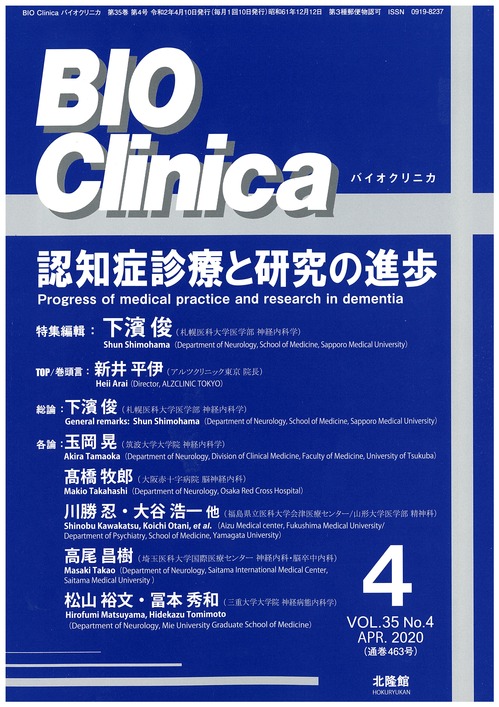News&Topics
Information
2020/03/30InformationResearch
FPP's Research Report Appears in "BIO Clinica"
In the medical journal "BIO Clinica Vol.35 No.4 APR. 2020 - Progress of treatment and research on dementia", appeared a research report written by Dr. Shoko Okuda, the Osato Research Institute vice president, and Makiko Osato, the ORI researcher, entitled "Ameliorating Effect of FPP (Fermented Papaya Preparation) on oxidative stress in Alzheimer's Disease Patients: Possibility of FPP as a medical food for prevention of dementia"
"BIO Clinica" is a medical journal, of which chief editors are Prof. Tasuko Honjo of Kyoto University, Nobel laureate in Physiology or Medicine, and Prof. Kiyoshi Kurokawa of National Graduate Institute for Policy Studies. We had been requested to write a research report on FPP's control of the Growth of a Murine Melanoma in the journal "MSD (Medical Science Digest)" before, which brought us an opportunity to be requested to write a report again for the sister magazine.
This report was written about the possibility of FPP as medical food for prevention of dementia, based on the clinical research on oxidative stress of Alzheimer patients by Prof. Mario Barbagallo of Palermo University, the clinical research on diabetic patients by prof. Chandan K. Sen of Ohio State University, and research on redox control in the brain of Prof. Lee of Kanagawa Dental University.
Title of the research report
"Ameliorating Effect of FPP (Fermented Papaya Preparation) on oxidative stress in Alzheimer's Disease Patients: Possibility of FPP as a medical food for prevention of dementia"
The summary of the report is as follows:
Brain tissue is particularly susceptible to oxidative stress. Increased production of reactive oxygen species (ROS), reduced antioxidant systems, and decreased efficiency in repairing mechanisms have been linked to Alzheimer's disease (AD).
In 2015, Prof. Mario Barbagallo of Palermo University, Italy, studied effect of FPP on oxidative stress of AD patients through analysis. Studying 40 patients, 28 AD patients and 12 controls to assess oxidative stress of AD patients supplemented FPP, it is suggested that FPP decreased oxidative stress of AD patients by reducing excessive ROS. The onset and progress of AD is associated with increased oxidative stress, therefore, this result is a new finding suggesting that FPP may be helpful to prevent or control the progress of age-related neurodegenerative disorders due to excessive free radicals.
Further new findings were obtained by clinical researches on diabetic patients by prof. Chandan K. Sen of Ohio State University, suggesting that FPP promotes energy production in mitochondria and proving that FPP improves wound closure in type II diabetic patients.
Owing to the series of Diabetic studies, it has been recognized that FPP improves energy metabolism of diabetic patients with decreased immunity and enhance their immune system by activating respiratory burst, which is a part of immune response, and as the result, it was patented by Japanes patent office as Patent No. 6401792 "ATP Production Promoter, Mitochondrial Activity Promoter, and Immunostimulant" in September 2018.
Furthermore, Prof. Lee at Kanagawa Dental University conducted a clinical research on FPP to evaluate oxidative stress in the SHR brain in 2009. Supplementation (5-7 months) with FPP (50mg/rat/day) significantly increased the decay of the ESR images of the MCPROXYL, suggesting that FPP may have up-regulated the redox defense activity in the SHR brain.
The brain is our most energy-consuming organ. Diabetic patients have metabolic disorders of carbohydrate metabolism characterized by high blood glucose. Similarly, we consider that dementia patients have also metabolic disorders of glucose metabolism which is important as energy source for the brain.
Considering a series of FPP researches showing the improvement of energy metabolism of diabetic patients, as well as the regulation of oxidative stress by FPP without being limited by Blood Brain Barrier, the Osato Research Institute has been conducting a clinical research at Florida University Center for Cognitive Aging & Memory to evaluate FPP's potential to help energy production in the brain of dementia patients as well as elderly people with low energy metabolism.
The FPP researches on Type II diabetics has been proving the possibility of FPP to be useful for the treatments to prevent and delay dementia and further studies are expected.

